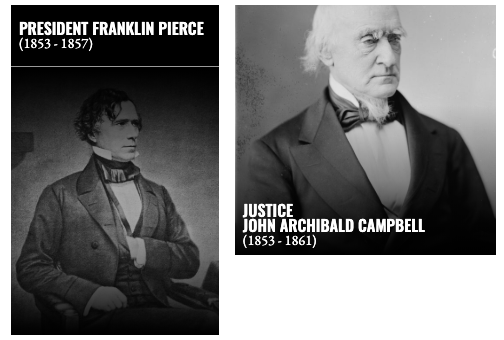The Volokh Conspiracy
Mostly law professors | Sometimes contrarian | Often libertarian | Always independent
Today in Supreme Court History: November 23, 1804
11/23/1804: President Franklin Pierce's birthday. He would appoint Justice John Archibald Campbell to the Supreme Court.

Editor's Note: We invite comments and request that they be civil and on-topic. We do not moderate or assume any responsibility for comments, which are owned by the readers who post them. Comments do not represent the views of Reason.com or Reason Foundation. We reserve the right to delete any comment for any reason at any time. Comments may only be edited within 5 minutes of posting. Report abuses.
Please to post comments


Awful justice chosen by an awful President. Campbell was the only Supreme Court Justice to resign after Fort Sumter and later served in Jefferson Davis's cabinet. Of course he was in the majority in the Dred Scott decision and argued that the Missouri Compromise was unconstitutional.
Much later he was also the lawyer for the New Orleans butchers in the Slaughterhouse Cases.
In the Arbery trial, pick up this gem from a news ticker:
Defense files for mistrial over protests outside courthouse: The defense filed another motion for a mistrial, after seeing a group of protesters with "large weapons" and a coffin containing the name of the defendants on the back of a truck outside the courthouse.
And for those who just thought "ha right winger fake news!" this was CNN.
Could you imagine what the media would do if the Proud Boys (or other so-called "white supremacist" organization) showed up with a coffin emblazoned with the name of someone who was a person of color? Here is was just like "oh yeah they have a first amendment right to do that so suck it...."
Campbell is best known for trying to mediate a solution to the Fort Sumter situation. The North couldn't talk directly to the Confederates since this would imply recognition, so Campbell could be a go-between.
Spoiler alert: It didn't work.
He's also one of the three southerners who tried to get a negotiated settlement in the spring of 1865. It was bit too late by then.